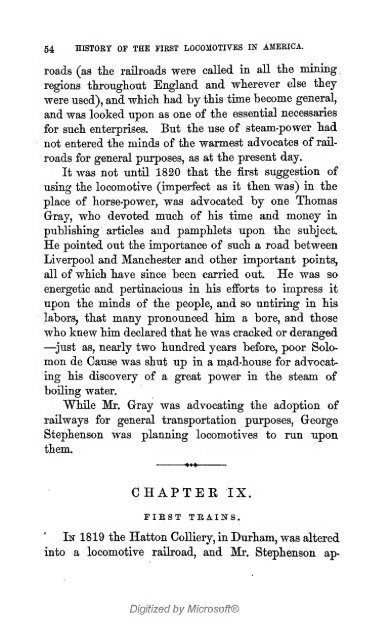The history of the first locomotives in America. From original ...
The history of the first locomotives in America. From original ...
The history of the first locomotives in America. From original ...
Create successful ePaper yourself
Turn your PDF publications into a flip-book with our unique Google optimized e-Paper software.
54<br />
BISTORT or THE FIRST LOCOMOTIVES IN AMERICA.<br />
roads (as <strong>the</strong> railroads were called <strong>in</strong> all <strong>the</strong> m<strong>in</strong><strong>in</strong>g<br />
regions throughout England and wherever else <strong>the</strong>y<br />
were used), and which had by this time become general,<br />
and was looked upon as one <strong>of</strong> <strong>the</strong> essential necessaries<br />
for such enterprises. But <strong>the</strong> use <strong>of</strong> steam-power had<br />
not entered <strong>the</strong> m<strong>in</strong>ds <strong>of</strong> <strong>the</strong> warmest advocates <strong>of</strong> rail-<br />
roads for general purposes, as at <strong>the</strong> present day.<br />
It was not until 1820 that <strong>the</strong> <strong>first</strong> suggestion <strong>of</strong><br />
us<strong>in</strong>g <strong>the</strong> locomotive (imperfect as it <strong>the</strong>n was) <strong>in</strong> <strong>the</strong><br />
place <strong>of</strong> horse-power, was advocated by one Thomas<br />
Gray, who devoted much <strong>of</strong> his time and money <strong>in</strong><br />
publish<strong>in</strong>g articles and pamphlets upon <strong>the</strong> subject.<br />
He po<strong>in</strong>ted out <strong>the</strong> importance <strong>of</strong> such a road between<br />
Liverpool and Manchester and o<strong>the</strong>r important po<strong>in</strong>ts,<br />
all <strong>of</strong> which have s<strong>in</strong>ce been carried out. He was so<br />
energetic and pert<strong>in</strong>acious <strong>in</strong> his efforts to impress it<br />
upon <strong>the</strong> m<strong>in</strong>ds <strong>of</strong> <strong>the</strong> people, and so untir<strong>in</strong>g <strong>in</strong> his<br />
labors, that many pronounced him a bore, and those<br />
who knew him declared that he was cracked or deranged<br />
—just as, nearly two hundred years before, poor Solomon<br />
de Cause was shut up <strong>in</strong> a mad-house for advocat-<br />
<strong>in</strong>g his discovery <strong>of</strong> a great power <strong>in</strong> <strong>the</strong> steam <strong>of</strong><br />
boil<strong>in</strong>g water.<br />
While Mr. Gray was advocat<strong>in</strong>g <strong>the</strong> adoption <strong>of</strong><br />
railways for general transportation purposes, George<br />
Stephenson was plann<strong>in</strong>g <strong>locomotives</strong> to run upon<br />
<strong>the</strong>m.<br />
CHAPTEE IX.<br />
FIRST TEAINS.<br />
In 1819 <strong>the</strong> Hatton Colliery, <strong>in</strong> Durham, was altered<br />
<strong>in</strong>to a locomotive railroad, and Mr. Stephenson ap-<br />
Digitized by Micros<strong>of</strong>t®
















